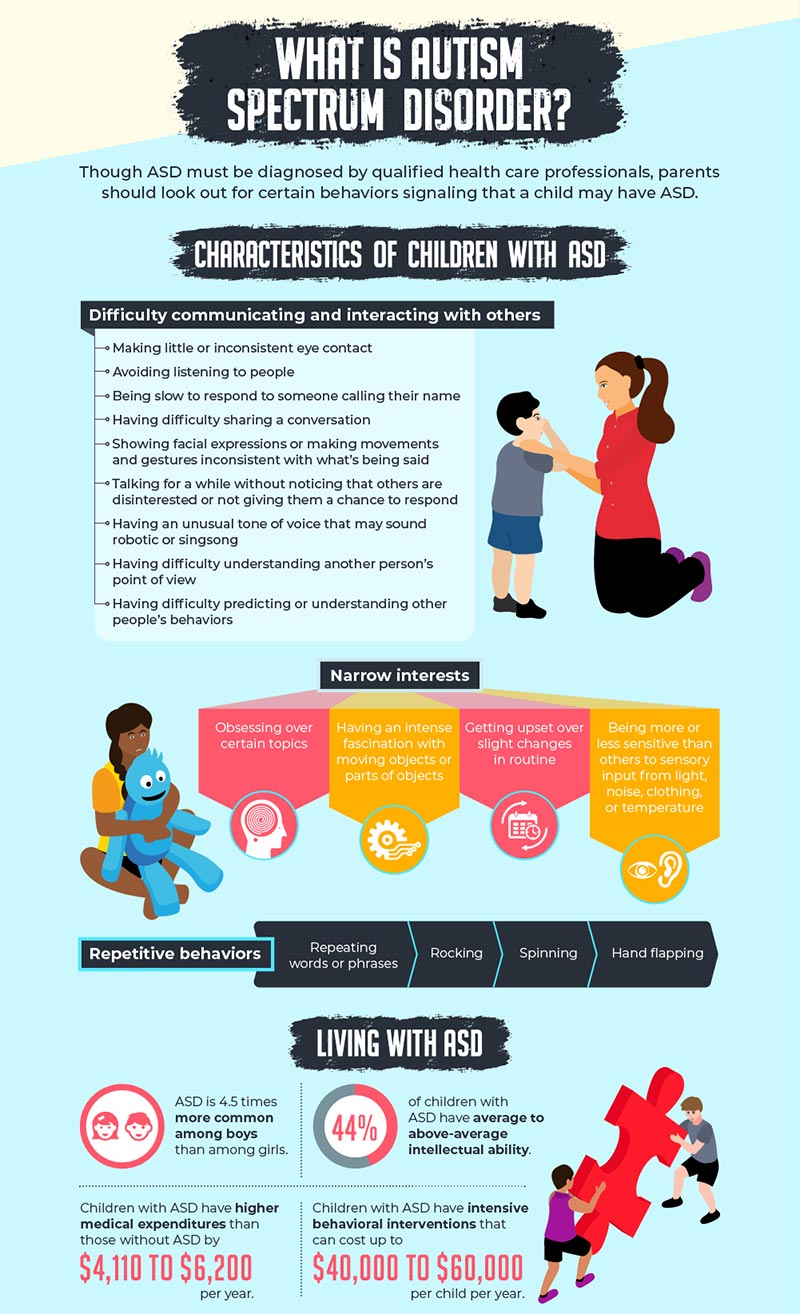Trick Signs and Symptoms to Recognize in People With Behavior Autism
When you experience a person with behavioral autism, acknowledging essential indications and signs is vital. Furthermore, sensory sensitivities can lead to overwhelming experiences.
Obstacles in Social Communications
When you engage with somebody on the autism range, you may notice they have a hard time with social hints and communication. These obstacles can make social communications feel frustrating for them.
When they do engage, they could chat about their interests in wonderful information without noticing if you're interested. Understanding these challenges can aid you approach interactions with empathy and perseverance, cultivating a much more comfy atmosphere for both of you.
Problem With Verbal and Non-Verbal Communication

Non-verbal communication can be even extra challenging. You may see a lack of eye contact or limited use gestures, which can make communications really feel uncomfortable. Faces may not constantly align with the conversation, resulting in confusion about their sensations. Recognizing these indicators is important, as it aids you much better support and engage with people on the autism spectrum. By understanding their interaction difficulties, you can foster a lot more significant links and supply a much more helpful setting.
Repeated Habits and Routines
Communication challenges commonly accompany other signs of autism, such as repetitive behaviors and a solid choice for regimens. You could discover that individuals with autism typically participate in certain, repeated activities, like hand-flapping, shaking, or repeating phrases. These habits can supply convenience and a sense of control in an usually frustrating world.
Routines are just as crucial; lots of people grow when they follow a structured schedule. You may find that changes to these regimens can result in considerable distress. For example, if they have an everyday ritual of consuming breakfast at a particular time or following a specific course to school, any kind of disruption can cause anxiety.
Identifying these patterns assists you understand their habits and provide support. By accommodating their need for regular and allowing repetitive activities, you can produce a more comfy atmosphere that relieves their difficulties.
Sensory Sensitivities

Usual Sensory Triggers
Sensory level of sensitivities can substantially affect every day life for people with autism, as specific stimuli frequently trigger overwhelming responses. Usual sensory triggers include loud sounds, intense lights, and strong scents. You could observe that abrupt sounds, like sirens or alarm systems, create stress and anxiety or distress. Fluorescent lighting in stores can really feel rough and awkward. Textures can additionally play a considerable function; rough fabrics or specific food appearances might be unbearable for you. Furthermore, crowded places can overwhelm your senses, making it tough to unwind or concentrate. Recognizing these triggers can help you manage your environment better. By knowing what influences you, you can take actions to minimize discomfort and improve your day-to-day experiences.
Behavioral Actions Described
Comprehending your behavioral responses to sensory sensitivities is essential, as they usually disclose exactly how you engage with the world. You might observe that specific noises, lights, or appearances overwhelm you, resulting in anxiousness or discomfort. When confronted with these stimuli, you could withdraw, cover your ears, and even react strongly. These feedbacks aren't just peculiarities; they're your method of coping with overstimulation. You may likewise find on your own seeking details sensory experiences, like deep stress or silent settings, to aid ground yourself. Acknowledging these patterns helps you understand your demands much better and can lead just how you connect them to others. By recognizing your sensory level of sensitivities, you can function in the direction of creating an atmosphere that feels more convenient and comfortable for you.
Coping Methods Overview
Acknowledging your sensory sensitivities is just the first step; now it's time to explore coping strategies that can aid you manage those experiences properly. Start by developing a sensory toolkit tailored to your needs. This could consist of noise-canceling headphones, fidget playthings, or soothing fragrances. Developing a structured regimen can likewise provide predictability, reducing anxiety around sensory overload. When you really feel overloaded, take breaks in a silent room to regroup. Exercising mindfulness methods like deep breathing can help ground you in the moment. In addition, interact your demands with those around you; having encouraging family and friends can make a massive distinction. Bear in mind, finding what functions ideal for you might require time, so be patient and open to attempting brand-new strategies.
Restricted Passions and Emphasis
While several individuals establish a variety of passions, those with autism usually demonstrate restricted interests and an intense concentrate on specific subjects. You might observe that a person with autism can invest hours delving right into their preferred topic, whether it's a particular kind of train, a certain flick, or a scientific principle. This intense focus isn't simply a leisure activity; it can come to be a main part of their identification and social interactions.
You may locate that discussions focus on these interests, and they might have a hard time to engage in more comprehensive subjects. For them, these concentrated rate of interests supply comfort and a sense of proficiency. While it is essential to urge exploration of brand-new topics, respecting their passions is equally essential. By comprehending and recognizing these restricted rate of interests, you can foster a supportive atmosphere where they feel valued and comprehended, enabling more meaningful links and communications.
Psychological Policy Troubles
People with autism typically face challenges in psychological policy, which can be influenced by their extreme concentrate on specific interests. You might discover that when a person is deeply participated in a preferred activity, they can experience strong emotions, whether enjoyment or irritation. When things do not go as planned., this strength occasionally makes it difficult for them to move gears or handle their feelings - Aba Therapist.

Variability in Developing Landmarks
When it comes to developmental check here landmarks, you'll notice that people with autism typically reveal a vast array of variability. You could see a child succeed in language skills however battle with social communications.
It's vital to acknowledge that each individual's trip is distinct. Some may develop complex abilities early, just to deal with obstacles in the future. Others may take longer to accomplish fundamental landmarks but then grow in particular locations. Observing these patterns can assist you recognize their strengths and requires better.
Often Asked Concerns
Just How Is Autism Detected in Kid and Grownups?
To diagnose autism in adults and kids, professionals evaluate behavior, interaction skills, and social communications. If an individual fulfills the criteria for autism range disorder., they typically make use of standardized examinations, interviews, and monitorings to figure out.
Are There Different Kinds Of Autism Spectrum Disorders?
Yes, there are different sorts of autism range problems, consisting of Asperger's disorder and prevalent developmental disorder-not otherwise defined. Each kind varies in intensity and attributes, so understanding these distinctions can aid you much better support people with autism.
What Treatments Are Reliable for Individuals With Autism?
When taking into consideration effective therapies for people click here with autism, you'll locate alternatives like Applied Behavior Analysis, speech treatment, and job-related therapy. Each approach can assist improve interaction, social skills, and daily functioning customized to specific demands.
Can Individuals With Autism Lead Independent Lives?
Yes, individuals with autism can lead independent lives. With the best assistance, skills training, and resources, you can help them develop self-sufficiency, handle day-to-day tasks, and prosper in numerous atmospheres, cultivating their self-reliance.
Exactly How Can Family Members Support Enjoyed Ones With Autism?
You can sustain your loved ones with autism by producing an organized atmosphere, encouraging their interests, exercising patience, fostering interaction, and promoting social abilities. Commemorate their achievements, no matter how small, and construct a helpful community.
Although many individuals on the autism range can use and understand language, they usually face substantial challenges with both spoken and non-verbal interaction. Recognizing these signs is important, as it helps you much better assistance and engage with individuals on the autism range. You may discover that individuals with autism commonly engage in details, repetitive activities, like hand-flapping, shaking, or repeating expressions.Sensory sensitivities can substantially impact daily life for people with autism, as particular stimuli more info typically cause frustrating responses.When it comes to developmental landmarks, you'll notice that individuals with autism usually reveal a broad array of variability.
Comments on “Recognizing emotional signals through Autism Therapist-backed methods”